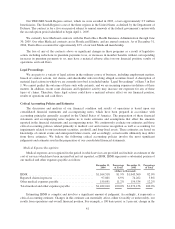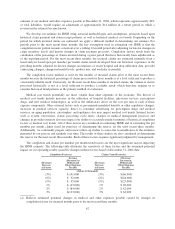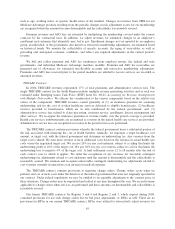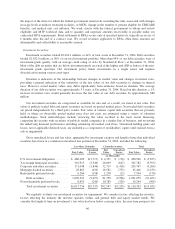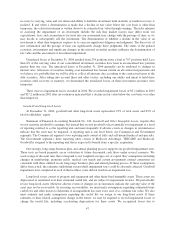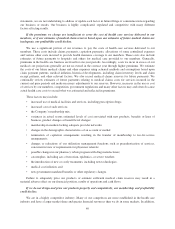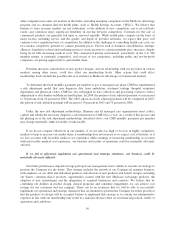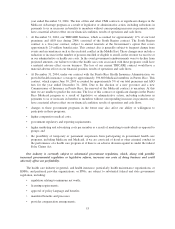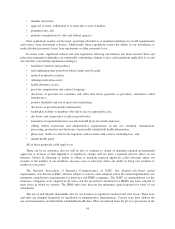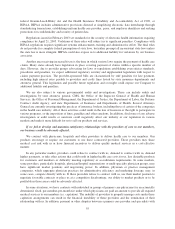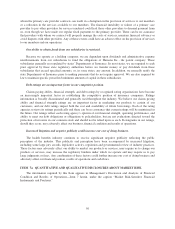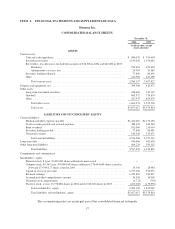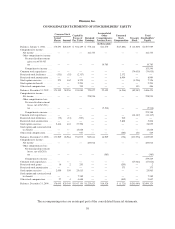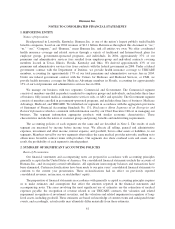Humana 2004 Annual Report Download - page 61
Download and view the complete annual report
Please find page 61 of the 2004 Humana annual report below. You can navigate through the pages in the report by either clicking on the pages listed below, or by using the keyword search tool below to find specific information within the annual report.If we fail to properly maintain the integrity of our data, or to strategically implement new information
systems, or to protect our proprietary rights to our systems, our business could be materially adversely
affected.
Our business depends significantly on effective information systems and the integrity and timeliness of the
data we use to run our business. Our business strategy involves providing members and providers with easy to
use products that leverage our information to meet their needs. Our ability to adequately price our products and
services, provide effective and efficient service to our customers, and to timely and accurately report our
financial results depends significantly on the integrity of the data in our information systems. As a result of our
past and on-going acquisition activities, we have acquired additional systems. We have been taking steps to
reduce the number of systems we operate, have upgraded and expanded our information systems capabilities, and
are gradually migrating existing business to fewer systems. If the information we rely upon to run our businesses
was found to be inaccurate or unreliable or if we fail to maintain effectively our information systems and data
integrity, we could have operational disruptions, have problems in determining medical cost estimates and
establishing appropriate pricing, have customer and physician and other health care provider disputes, have
regulatory problems, have increases in operating expenses, lose existing customers, have difficulty in attracting
new customers, or suffer other adverse consequences. Our information systems require an ongoing commitment
of significant resources to maintain, protect and enhance existing systems and develop new systems to keep pace
with continuing changes in information processing technology, evolving industry and regulatory standards, and
changing customer preferences.
We depend on independent third parties for significant portions of our systems-related support, equipment,
facilities, and certain data, including data center operations, data network, voice communication services and
pharmacy data processing. This dependence makes our operations vulnerable to such third parties’ failure to
perform adequately under the contract, due to internal or external factors. A change in service providers could
result in a decline in service quality and effectiveness or less favorable contract terms which could adversely
affect our operating results.
We rely on our agreements with customers, confidentiality agreements with employees, and our trade
secrets and copyrights to protect our proprietary rights. These legal protections and precautions may not prevent
misappropriation of our proprietary information. In addition, substantial litigation regarding intellectual property
rights exists in the software industry. We expect software products to be increasingly subject to third-party
infringement claims as the number of products and competitors in this area grows.
There can be no assurance that our process of improving existing systems, developing new systems to
support our operations, integrating new systems, protecting our proprietary information, and improving service
levels will not be delayed or that additional systems issues will not arise in the future. Failure to adequately
protect and maintain the integrity of our information systems and data may result in a material adverse effect on
our financial positions, results of operations and cash flows.
If we fail to manage prescription drug costs successfully, our financial results could suffer.
In general, prescription drug costs have been rapidly rising over the past few years. These increases are due
to the introduction of new drugs costing significantly more than existing drugs, direct to consumer advertising by
the pharmaceutical industry that creates consumer demand for particular brand-name drugs, and members
seeking medications to address lifestyle changes. In order to control prescription drug costs, we have
implemented multi-tiered copayment benefit designs for prescription drugs, including our four-tiered copayment
benefit design, Rx4 and an Rx allowance program organized by evidence based impact. We cannot assure that
these efforts will be successful in controlling costs. Failure to control these costs could have a material adverse
effect on our financial position, results of operations and cash flows.
51


